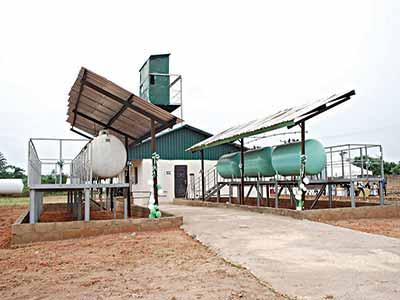


Govt steps up pollution control, opens hydrocarbon plant
in Properties

AS part of the Nigerian efforts to phase out the use of Ozone Depleting Substances (ODS) and prevent negative consequences on the nation’s ecological system and human health, the Federal Government last week commissioned a hydrocarbon plant, located at the ozone village, Irolu, Ikenne Local Government Area, Ogun State.
The plant is essentially for the production of high-grade hydrocarbon refrigerants, which are to be used in the refrigeration manufacturing and its related servicing sectors in Nigeria.
Indeed, the project is being implemented under the auspices of the Montreal Protocol on Substances that deplete the ozone layer, to which Nigeria is a party.
Also, the commissioning of the plant came on the heel of developing countries implementing the Montreal Protocol’s Hydrocloroflurocarbons Phase Out Management Plan (HPMP) with a view to phasing out Hydrochoroflurocarbons (HCFCs) by 2040.
HCFCs are transitional substitutes to CFCs, used as refrigerants in the refrigeration and air-conditioning sector and also as blowing agents in the foam sector, due to their low Ozone Depleting Potential (ODP). While ODPs of HCFCs are in the low range, they re also potent greenhouse gases with Global Warming Potentials (GWPs).
Therefore, in September 2007, the parties to the Protocol adjusted to accelerate the phase-out schedule for these chemicals. Parties were also encouraged to move to climate friendly alternatives that will not only be friendly to the ozone layer, but that will also not exacerbate the problem of climate change.
Currently, through assistance from the Multilateral Fund (MLF) for the implementation of the Protocol, the Federal Government, through the Ministry of Environment, is implementing Nigeria’s stage 1 of the hydrochlorofluoracarbons phase out management plan (HPMP) to phase out the use of hydrochlorofluocarbons (HCFCs) for which Nigeria had completed the 4th tranche.
The United Nations Development Programme (UNDP) is the lead implementing agency while United Nations Industrial Development Programme (UNIDO) is the cooperating agency.
Speaking during the commissioning of the plant, Minister of State, Federal Ministry of Environment, Ibrahim Jibril, said the first stage implementation of the HPMP commenced in 2011 and is expected to be completed by the end of 2015.
According to him, the HC pilot project is one of the main components of the project and was designed to demonstrate the feasibility of replacing the current use of HCFCs refrigerant in the refrigeration and air-conditioning (RAC) sector, with the hydrocarbon refrigerant based technology.
To ensure the local technicians are familiar with the drive, the minister said, the commissioning of the plant, would be followed up by a well-structured training/certification programme for Nigerians refrigeration and air-conditioning technicians nationwide on the safe use of HC refrigerants in their applications.
“The Ministry will continue to ensure that stakeholders are provided with the necessary knowledge on procedures for practical use of HC refrigerants; basic training and preventive measures to reduce hydrocarbon emission when carrying out regular maintenance services; hands-on training and use of HC refrigerants to operate domestic based air-conditioning and refrigeration appliances; and basic hydrocarbon and R&AC working tools for effective refrigerant management; and stimulating the development of a network for information sharing in the sector.”
Reaffirming the success of the pilot project, Jibril said the plant could now be expanded for commercial purposes, adding that, the advantages derivable from establishing the HC plant including readily available raw materials (LPG) for producing HC refrigerants, availability of high grade HC refrigerant for use by refrigeration and air-conditioning technicians in not only the country but the whole of African region and building local capacity to produce energy efficient low Global Warming Potential (GWPs) gases.
Source: TheGuardian
Share this post
Naijanetwork Forum Statistics
Threads: 14865,
Posts: 17924,
Members: 6716


